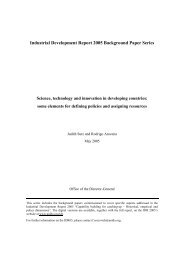Manual on the Development of Cleaner Production Policies ... - Unido
Manual on the Development of Cleaner Production Policies ... - Unido
Manual on the Development of Cleaner Production Policies ... - Unido
Create successful ePaper yourself
Turn your PDF publications into a flip-book with our unique Google optimized e-Paper software.
DEVELOPMENT OF CP POLICY<br />
MODULE 4: POLICY TOOLS AND INSTRUMENTS<br />
Public recogniti<strong>on</strong> and awards<br />
Public recogniti<strong>on</strong> and awards are an effective instrument for building awareness <strong>of</strong> <strong>the</strong> c<strong>on</strong>cept <strong>of</strong> CP<br />
and promoting its practical implementati<strong>on</strong>. There are a variety <strong>of</strong> awards in existence that recognize<br />
dem<strong>on</strong>strated accomplishments by industry in incorporating sound envir<strong>on</strong>mental practices, c<strong>on</strong>cepts<br />
and knowledge into planning and operating procedures. Some are specifically related to <strong>Cleaner</strong><br />
Producti<strong>on</strong> (e.g. Nati<strong>on</strong>al CP Recogniti<strong>on</strong> for Industry in Nicaragua), while o<strong>the</strong>r schemes reward a<br />
proactive envir<strong>on</strong>mental approach.<br />
In additi<strong>on</strong> to <strong>the</strong> award schemes used in industry (not to be c<strong>on</strong>fused with a formal Envir<strong>on</strong>ment<br />
Management System or product-labelling certificati<strong>on</strong> scheme), <strong>the</strong>re are programmes that recognize<br />
individuals (e.g. policy makers or opini<strong>on</strong> leaders) and municipal governments.<br />
EXAMPLE<br />
PROPER Ind<strong>on</strong>esia<br />
The Programme for Polluti<strong>on</strong> C<strong>on</strong>trol, Evaluati<strong>on</strong> and Rating (PROPER) initiative was launched in<br />
Ind<strong>on</strong>esia in June 1995 by <strong>the</strong> Envir<strong>on</strong>mental Impact and Management Agency. The envir<strong>on</strong>mental<br />
performance <strong>of</strong> individual industrial enterprises is evaluated and rated by <strong>the</strong> agency using a fivecolour<br />
rating system. The highest-level category is reserved for those firms that, in additi<strong>on</strong> to having<br />
performance bey<strong>on</strong>d legal compliance, have implemented <strong>Cleaner</strong> Producti<strong>on</strong> practices and advanced<br />
envir<strong>on</strong>mental management systems. The results <strong>of</strong> <strong>the</strong> programme are publicly reported through <strong>the</strong><br />
press and <strong>on</strong> <strong>the</strong> Internet, and those firms whose performance voluntarily exceeds regulatory standards<br />
are rewarded. The rati<strong>on</strong>ale is that <strong>the</strong> high-pr<strong>of</strong>ile disclosure <strong>of</strong> <strong>the</strong> envir<strong>on</strong>mental ratings will be a<br />
powerful incentive for industries to improve <strong>the</strong>ir performance.<br />
Product labelling<br />
Product labelling refers to <strong>the</strong> process by which an independent, third-party entity verifies that a<br />
product has been produced and processed according to a specific set <strong>of</strong> standards. Envir<strong>on</strong>mental<br />
labels assist c<strong>on</strong>sumers to make resp<strong>on</strong>sible product choices, by informing <strong>the</strong>m <strong>of</strong> <strong>the</strong> envir<strong>on</strong>mental<br />
impacts <strong>of</strong> products and providing a standardized means <strong>of</strong> comparing products.<br />
Eco-labels aim to provide informati<strong>on</strong> to c<strong>on</strong>sumers about <strong>the</strong> envir<strong>on</strong>mental impacts <strong>of</strong> <strong>the</strong> product or<br />
service carrying <strong>the</strong> label. This allows c<strong>on</strong>sumers to express <strong>the</strong>ir envir<strong>on</strong>mental preferences through<br />
<strong>the</strong>ir choice <strong>of</strong> products. There are three broad types <strong>of</strong> eco-labels:<br />
1. Comprehensive labelling schemes attempt to evaluate <strong>the</strong> total envir<strong>on</strong>mental impact <strong>of</strong> a product<br />
or service against a set <strong>of</strong> comprehensive pre-established criteria (e.g. Eco-label <strong>of</strong> <strong>the</strong> EU, Blue<br />
Angel in Germany);<br />
2. Specific labelling schemes take <strong>on</strong>e part <strong>of</strong> a product’s life cycle and evaluate it against specific<br />
criteria (e.g. water efficiency or energy efficiency ratings);<br />
3. Product labelling schemes have, to date, generally related to food items, for example, <strong>the</strong><br />
labelling <strong>of</strong> organically grown produce.<br />
PAGE 106
















